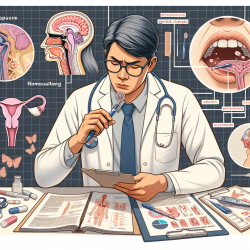Introduction
As a speech-language pathologist, understanding the nuances of how menopause affects swallowing can be pivotal in improving patient outcomes. The scoping review titled "The Relationship Between Menopause and Dysphagia" sheds light on this under-researched area, highlighting the potential impacts of menopause on swallowing-related structures and functions. This blog will explore the findings of the review and discuss how practitioners can utilize this information to enhance their clinical practice.
Key Findings from the Scoping Review
The review conducted by Lenell et al. (2022) compiled and summarized existing literature on the relationship between menopause and swallowing. The research identified several areas where menopause negatively impacts oral health and potentially affects swallowing, including:
- Oral Health Changes: Menopause is associated with symptoms like xerostomia (dry mouth), hyposalivation, and oral mucosa inflammation, which can impair swallowing efficiency.
- Bone and Muscle Effects: The loss of estrogen during menopause can lead to decreased bone density in the mandible and changes in muscle function, affecting the mechanics of swallowing.
- Salivary Composition and Flow: Postmenopausal women often experience changes in salivary flow and composition, which can impact bolus formation and swallowing safety.
Implications for Practice
Understanding these findings is crucial for speech-language pathologists who work with postmenopausal women. Here are some ways practitioners can apply this knowledge:
- Enhanced Assessment: Incorporate questions about menopause-related symptoms during dysphagia assessments to better understand the potential impact on swallowing.
- Targeted Interventions: Develop interventions that address specific menopause-related changes, such as strategies to manage dry mouth or exercises to strengthen oral and pharyngeal muscles.
- Collaboration with Other Healthcare Providers: Work closely with gynecologists and endocrinologists to monitor hormone levels and consider the potential benefits of hormone replacement therapy on swallowing functions.
Encouraging Further Research
While the scoping review provides valuable insights, it also highlights significant gaps in the literature. Practitioners are encouraged to contribute to this field by:
- Conducting research on the direct effects of menopause on swallowing functions.
- Exploring the efficacy of various therapeutic interventions for menopause-related dysphagia.
- Investigating the role of hormone replacement therapy in mitigating swallowing difficulties.
Conclusion
Menopause is a critical factor influencing swallowing, yet its effects remain underexplored in speech-language pathology. By integrating the findings from the scoping review into clinical practice and encouraging further research, practitioners can significantly enhance the quality of care for postmenopausal women with dysphagia.
To read the original research paper, please follow this link: The Relationship Between Menopause and Dysphagia: A Scoping Review.










